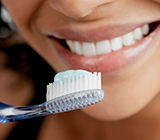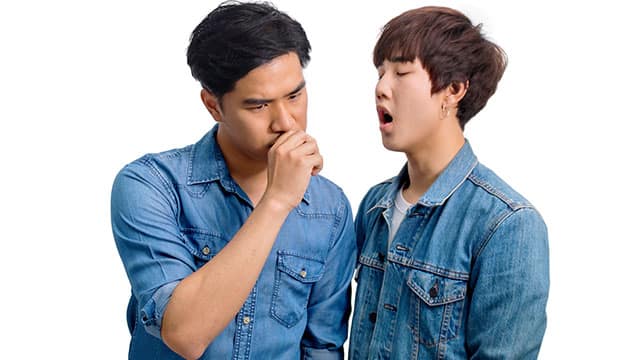Sinus Infection
Have any of your kids complained about a sore throat or stuffy nose lately? You may not realise it, but sinus infections can be a cause of bad breath in kids. Sinus issues cause fluid to collect in the nasal passages and throat, making your child's throat the perfect place for bacteria to gather. The result? Stinky breath that can't be cured with toothbrushing and mouthwash alone. If you suspect they have a sinus infection (potential sore throat, burning nasal passages and post-nasal drip), call your doctor for a visit and see if antibiotics will be prescribed.
Foreign Objects
It may not be your first thought, but childhood bad breath can be the result of something stuck in your kid's nasal passages. Kids are curious, and their nostrils are just the right size for inserting small items such as beads, beans, toy accessories and food. When an object gets lodged in a child's nasal passages it can create a nasty smell. If you suspect this is what’s causing your child's bad breath, you'll need a doctor to help check their nasal passages and remove the object.
Swollen Tonsils
Grab a torch and take a peek in your child's mouth: How do those tonsils look? Healthy tonsils should be pink and spot-free, but infected ones are red, inflamed, can have white spots and smell terrible. Bacteria can collect in the pits of swollen tonsils and, paired with the sour smell of infection, can cause bad breath. If your child's tonsils look swollen or red, your pediatrician should examine them and can prescribe an antibiotic to help take care of the problem.
Dry Mouth
Kids are pretty active and, with all that running around, it can be hard for them to remember to stay hydrated. Bad breath in children who play sports is often caused by a lack of fluids. If kids don't get enough water, their mouths will produce less saliva to wash away odor-causing bacteria. It might not seem like a big deal, but a lack of saliva can also even lead to tooth decay and cavities; so it's worth the extra care to make sure kids drink their water.
Oral Issues: Tooth Decay and Gum Disease
Even the best brushing and oral hygiene habits aren't enough to get rid of the smell that can come from tooth decay and other oral infections. Whether it's a cavity, gum disease or even mouth sores, infections of the mouth can secrete a bad scent. Kid-specific toothpaste will help prevent issues from spreading, but brushing can't heal a cavity. If your kids have tooth decay, it's time to see your dentist.
Tips for Managing and Preventing Childhood Bad Breath
If your child is suffering from ongoing bad breath, it’ll take more than just brushing their teeth to solve the problem. Take them to the dentist to identify the underlying cause, then make sure they’re following a thorough oral care routine every day. Here are some tips that can help:
- Teach them to brush and floss their teeth properly twice a day. If they’re younger than 7 years old, supervise them to make sure they’re cleaning their teeth properly.
- Make sure they don’t forget to brush or scrape their tongue – lots of bad-smelling bacteria like to hang out there!
- Feed them a healthy diet with plenty of vegetables, fruits and whole foods. Limiting sugary or starchy foods will help with bad breath and can help to prevent tooth decay.
- Make sure they’re drinking plenty of water throughout the day to stay hydrated and rinse any bacteria from their mouth.
- Make sure they eat breakfast – this can help with saliva production and minimise morning breath.
- If your child is a bit older, let them chew sugar-free chewing gum in between meals or after a snack.
- Check if your child breathes through their mouth – this habit can cause bad breath! Your doctor or dentist will be able to give you advice on this.
If they’re on medication for other health conditions, talk to your dentist about their bad breath being a possible side effect.
- Make sure you take your child to the dentist for regular check-ups and cleaning to make sure their mouth stays healthy.
Don't make the mistake of thinking that bad breath in kids is the result of them skipping the most important part of their usual bedtime routine. Do your research and ask for your dentist’s help with the issue – bad breath in kids is usually easily manageable once you know the cause!
This article is intended to promote understanding of and knowledge about general oral health topics. It is not intended to be a substitute for professional advice, diagnosis or treatment. Always seek the advice of your dentist or other qualified healthcare provider with any questions you may have regarding a medical condition or treatment.
ORAL HEALTH QUIZ
What's behind your smile?
Take our Oral Health assessment to get the most from your oral care routine
ORAL HEALTH QUIZ
What's behind your smile?
Take our Oral Health assessment to get the most from your oral care routine











